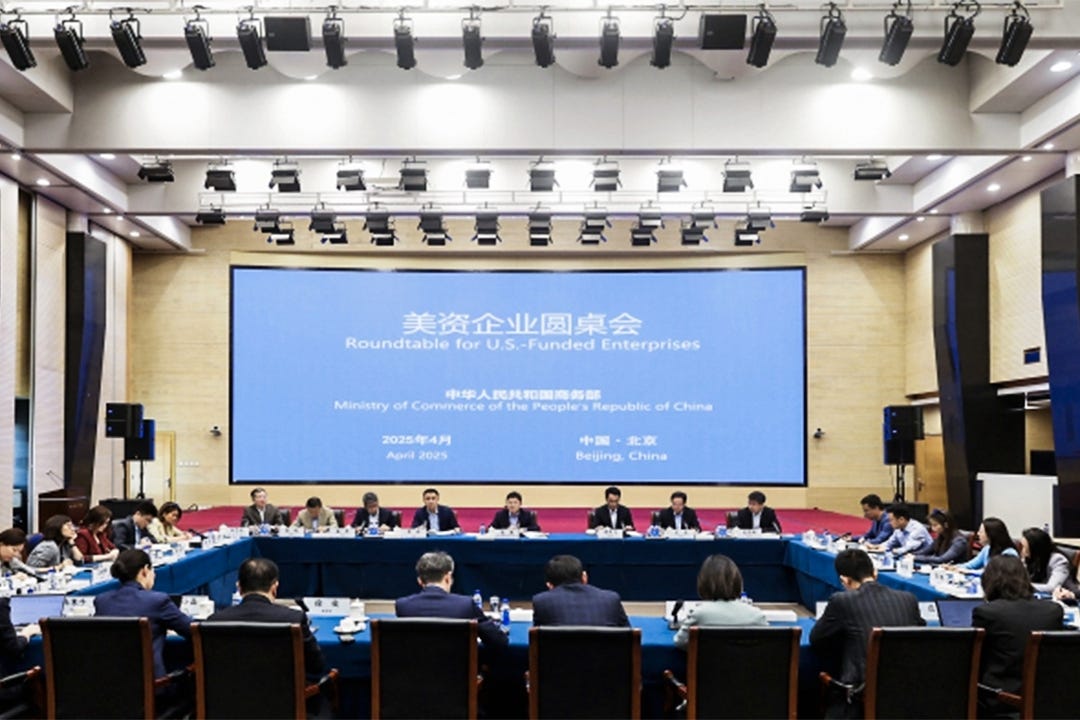Free to Read: China’s Commitment to Opening-Up Will Benefit the World
No matter how severe the tariff shocks, they are short term and will not reverse international economic integration and advancements in the global trading system
Ling Ji, vice minister of commerce and deputy representative for international trade negotiations, presides over a roundtable meeting for US-funded enterprises on April 6. Photo: MOFCOM
The “reciprocal tariffs” recently announced by the U.S. have triggered an unprecedented tariff war, which has not only impacted global trade but also directly tested countries’ trade policies. Recently, the Ministry of Commerce stated at a roundtable with U.S. businesses that regardless of international changes, China remains unwavering in advancing reform and opening-up. Multilateralism is the inevitable choice for solving the difficult challenges facing the world and China’s door will only open wider, while policies on utilizing foreign investment remain unchanged. This statement clarifies China’s basic position toward foreign enterprises, including American firms. At this critical juncture, clearly stating this position and showing sincerity undoubtedly helps stabilize foreign investors’ expectations.
The commerce ministry promised to “continue providing protection for foreign enterprises in China, including American businesses, safeguard their legitimate rights and interests according to law, and actively address their concerns.” It’s essential to genuinely understand foreign companies’ demands and respond effectively. While the U.S. is sending mixed signals and constantly changing policies, China is maintaining a relatively clear and consistent stance, which is attractive for multinational companies.
China integrated into the global economic cycle through reform and opening-up, greatly stimulating the vitality of China’s economy and society. As the world’s largest goods trading nation for many years, China has also injected strong momentum into the global economy. The country’s actual use of foreign direct investment grew from $920 million in 1983 to $163.3 billion in 2023, maintaining a world-leading position for consecutive years. Meanwhile, foreign companies have shared in China’s development achievements and earned substantial returns. No matter how severe the short-term shocks from the tariffs, the international division of labor based on comparative advantages will not reverse, and the mutually beneficial global trade network will not collapse. The U.S. trade and tariff wars will inevitably harm both sides and have no possibility of reversing economic globalization.
Due to the rise of unilateralism and protectionism in recent years, multinational companies have been adjusting their global layouts. Combined with the trade frictions initiated during President Donald Trump’s first term, multinationals’ diversification and regionalization have gradually accelerated. Some foreign observers point out that under current circumstances, China may become a more attractive investment “safe haven.” Some multinational companies have recently explicitly stated they hope China continues to hold high the banner of reform and opening-up, adhere to its strategic direction, and focus on its own affairs, as global supply chains cannot function without China. China should continue to optimize its business environment through systematic reforms aligned with international rules, creating favorable conditions for foreign enterprises.
“Focusing on China’s own affairs” means continuously enhancing both soft and hardware capabilities. China’s market attracts foreign investment primarily based on its relatively complete infrastructure, comprehensive industrial chain, skilled workforce, and affordable labor costs, while China itself is also a huge consumer market. As new technologies emerge and industries upgrade, hardware aspects need timely updates and improvements, such as the impact of artificial intelligence technology on various industries over the past two years.
Our focus should be on continuously improving the market-oriented, law-based, and internationalized business environment. Recently, the Communist Party’s leadership and the State Council issued “Opinions on Improving Price Governance Mechanisms,” clearly stating that “prices that can be formed by the market should be left to the market.” China should turn pressure into motivation, viewing the response to U.S. challenges as a strategic opportunity to accelerate the construction of a new development pattern, promote high-quality development, and facilitate economic restructuring, injecting more stability into global economic development.
Several U.S. administrations have attempted to bring manufacturing back to America with limited success, as this contradicts the laws of industrial development. The Trump administration’s reliance on high-pressure tariffs will not achieve its desired outcome either. Industrial changes follow economic laws that cannot be altered by anyone’s will. Currently, China’s manufacturing output accounts for 35% of the global total, and China has completely eliminated foreign investment access restrictions in manufacturing. In February this year, the Chinese government issued the “2025 Action Plan for Stabilizing Foreign Investment,” proposing orderly expansion of opening-up, with “expanding pilot projects in telecommunications, health care, education, and other fields” listed as the first item. China should concentrate on handling its own affairs and solidly promote the modernization of its national governance system and capacity.
China’s economic ship is currently weathering storms. Over the past 40-plus years, China has faced severe challenges, but no matter how adverse the environment, the country has never closed its door to the outside world. It is precisely through reform and opening-up that China’s economy has overcome one difficult obstacle after another and achieved its current global position. Both historical enlightenment and current needs remind us to expand opening-up, stabilize foreign trade and investment, share development opportunities with the world, and achieve mutual benefits.




